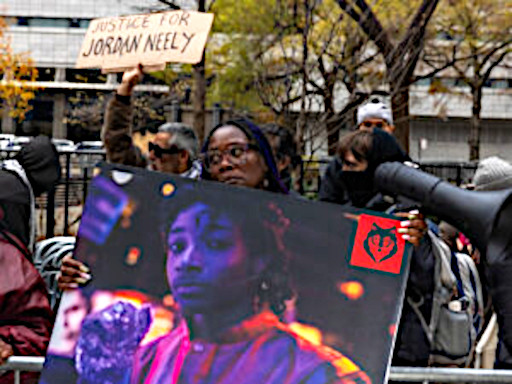

On May 1, 2023, Jordan Neely was strangled to death in a New York City subway car. Yesterday, Dec. 9, his killer, Daniel Penny, was found not guilty of criminally negligent homicide and had the more severe charge of manslaughter dismissed because of a hung — predominantly white — jury.


Protest outside Manhattan Criminal Courthouse, where the trial of racist killer Daniel Penny was taking place. Photo websource: abcnews.go.com
Neely, 30, was a Black street performer struggling with severe mental illness, homelessness and trauma stemming from the murder of his mother at a young age. On the day of his slaying, Neely boarded the subway in the midst of an apparent mental health crisis, threw his jacket to the floor complaining of hunger and thirst and saying that he did not care whether he was imprisoned or if he died.
Penny, treating this desperate plea for help as a threat, crept up behind Neely and placed him in a chokehold. Neely struggled to escape and pleaded with onlookers to help, and one bystander called out that Penny was killing him. Penny did not loosen his grip for almost seven minutes, one full minute after Neely had apparently fallen unconscious.
Penny is a veteran of the U.S. Marines, but it doesn’t take a trained killer like him to understand that depriving someone of air for an extended period of time kills them. That anyone could countenance the idea that any other outcome had crossed his mind is baffling — unless one is familiar with the treatment of mentally ill people, especially homeless mentally ill people, and even more especially Black, homeless, mentally ill people in the U.S. The police routinely use excessive force, including lethal force, against people experiencing mental health crises.
During the 2020 uprisings after the murder of George Floyd and others at the hands of police, some of the more moderate demands raised by protesters included better training for police who are called to deal with these crises or for these calls to be handled by other first responders with such training. Rather than implementing even these modest reforms, Democratic and Republican politicians came together to increase funding for police, to swell their ranks, and to give them even more military hardware and training.
And now, with this verdict, the precedent is set for private citizens to mete out death to anyone, especially a person of color, who they think is too loud or scary.
That this verdict was decided in New York state is not surprising. Governor Kathy Hochul and disgraced New York City Mayor Eric Adams collaborated last year to step up the militarization of the Metropolitan Transit Authority, increasing patrols by the New York Police Department and the National Guard in order to combat fare beating. This effort cost more than the lost fare revenue and led to a shooting in September, when NYPD cops shot a fare beater, two bystanders and one of their own.
The Penny verdict flies in the face of the state’s posturing around mental health, which has seen a flurry of stickers issued by the state Office of Mental Health proclaiming “it’s okay to not be okay,” and adopting the cute social media messaging of “tacos fall apart but we still love them.”
Mental illness has a social aspect that is routinely ignored by liberal outlooks — stickers and hotlines don’t put food in a person’s belly or a roof over their head.
Social media posts about awareness do nothing to provide the security and safety mentally ill people need to keep from spiraling out of control. Bullets and strangulation are not the care we need or deserve.
This statement was recently issued by over 30 groups. On Friday, March 28, Dr. Helyeh…
When Donald Trump announced massive tariffs on foreign imports April 2, Wall Street investors saw…
The century-long struggle to abolish the death penalty in the U.S. has been making significant…
Download the PDF May Day appeal to the working class Revolutionary change is urgent! Gaza…
Philadelphia On March 26, the Pennsylvania Supreme Court denied political prisoner Mumia Abu-Jamal permission to…
There are two important and overlapping holidays on April 22: Earth Day and Vladimir Lenin’s…